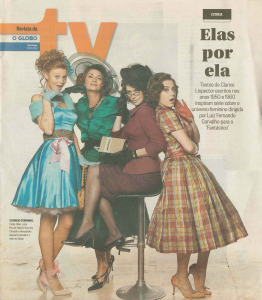9, Oct — 2013
With Luiza Brunet, Fantástico Launches Silent Series About Women’s Dilemmas
- Folha de S.Paulo
“To which extent women’s issues have been solved or dropped?” said Luiz Fernando Carvalho at the series rollout.
Leia Mais
27, Oct — 2013
A Woman on Women
- O Globo
“Males are framed in dogmas, do as preached. Women are knowledgeable of the language of the invisible, the body, the affections, the imagination, the silence, and subtleness. Women seek doubts, break paradigms. The framing of everything in the same model is quite a masculine deed,” the director compares.
Leia Mais19, Oct — 2013
Ladies’ Mail: Clarice Lispector’s Texts In a Segment of Fantástico
- Marie Claire
“Directed by Luiz Fernando Carvalho (Today is Maria’s Day and After All, What Does A Woman Want?), the eight episodes are driven by the voice of actress Maria Fernanda Cândido – as she speaks, three women respond to Clarice’s words.”
Leia Mais26, Oct — 2013
Luiz Fernando Carvalho Directs ‘Ladies’ Mail,’ which Airs on ‘Fantástico’
- O Dia
“In addition to directing, Carvalho spearheads the music production, with hits from the 1960s, ranging from ‘Love Me Tender’ by Elvis Presley to ‘A Banda’ by Nara Leão. In turn, incidental songs are selected by the composer and pianist André Mehmari, invited by Carvalho.”
Leia Mais9, Oct — 2013
Cintia Dicker: The ‘Eloquent Ginger’ And Her Actress Debut
Luiz Fernando Carvalho: “An artist is always at birth, en route. We are always incomplete.”
Leia Mais26, Oct — 2013
Clarice Lispector in Fantástico TV Show Chitchat
- Folha de S.Paulo
“I don’t accept the frowning of some folks who underappreciate the almanacs vis-à-vis her other great novels, and fail to see them as a worthy part of Clarice Lispector’s work,” says Luiz Fernando Carvalho, who has already adapted works by authors such as Machado de Assis and Raduan Nassar for TV and the movies.
Leia Mais9, Oct — 2013
New Series of TV Show Fantástico Features Maria Fernanda Cândido and Luiza Brunet
- UOL
Luiz Fernando Carvalho, with works of easily recognizable features, such as “Today Is Maria’s Day” and “Capitu”, tells that having a cast brave enough to reinvent itself was one of his intents with the series. “When developing the show, we’ve decided to start from scratch. We had to be brave to flirt with the unknown, not knowing where we were heading for. References got in the way, and only feelings were left there to surface.”
Leia Mais3, Jul — 2013
Luiza Brunet Returns to Television
- O Dia
Luiza Brunet: “When Luiz Fernando Carvalho called me, I couldn’t contain my excitement. That was dope! I was thrilled the whole weekend until Monday. I had already played roles in soap operas, but I didn’t like the outcome. Luiz Fernando is a real conductor. He can make you laugh, cry, and lose it. I was enraptured and fell in love with the work done.”
Leia Mais24, Oct — 2013
Clarice Lispector Gives Tips in Fantástico TV Show
- O Estado de S.Paulo
20, Oct — 2013
Three Generations Listen to Helen Palmer’s Advice on New Series
- G1
“How to seduce a man, take care of the house, maintain beauty, marriage? Let’s dive into the feminine universe from the view of one of the greatest writers of this country, Clarice Lispector.”
Leia Mais1, Oct — 2013
Clarice Lispector + Luiz Fernando Carvalho
- Moda pra ler
“Luiz Fernando Carvalho’s works are strikingly authorial and therefore he participates intensely in all stages. When the starting point is a literary work, he aims at maximum fidelity to the author’s narrative.”
Leia Mais25, Oct — 2013
Maria Fernanda Cândido’s Resourcefulness in Recounting Clarice Lispector’s Stories
- O Dia
“Maria Fernanda Cândido’s first contact with Clarice Lispector was at 18 with the classic The Hour of the Star. ‘That was how a deep fondness has started,’ she recalls.
Leia Mais16, Oct — 2013
‘I want a new cycle on TV,’ says Luiz Fernando Carvalho
- O Globo
Luiz Fernando Carvalho: “There was an invitation for me to propose something for the show, and this proposition pleased me because it meant thinking about something for an eclectic audience, from classes A to C, but predominantly for females, from ladies to young women. This was behind the concept of rescuing the feminine look of Helen Palmer, one of Clarice’s heteronyms, and proposing a link with the fashion advertising aesthetics of the 1960s. ”
Leia Mais